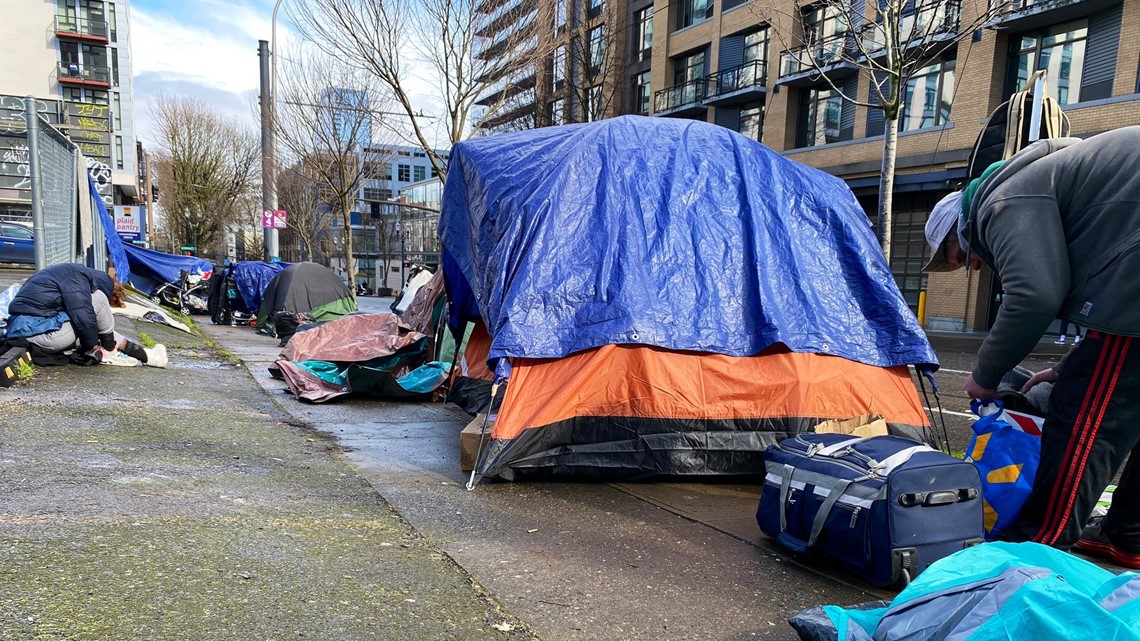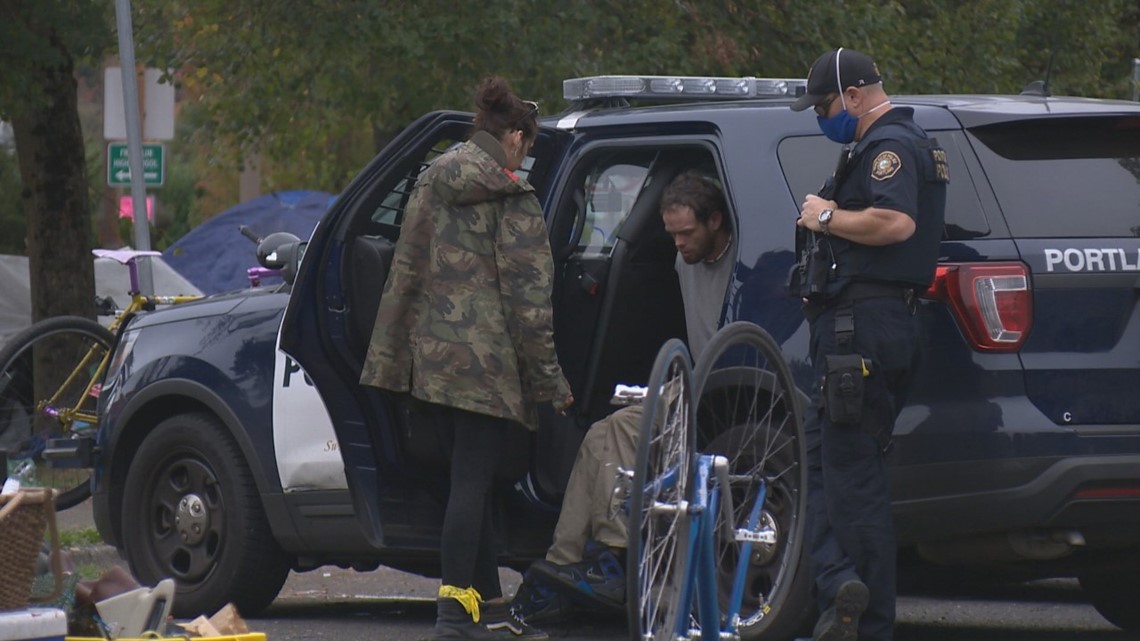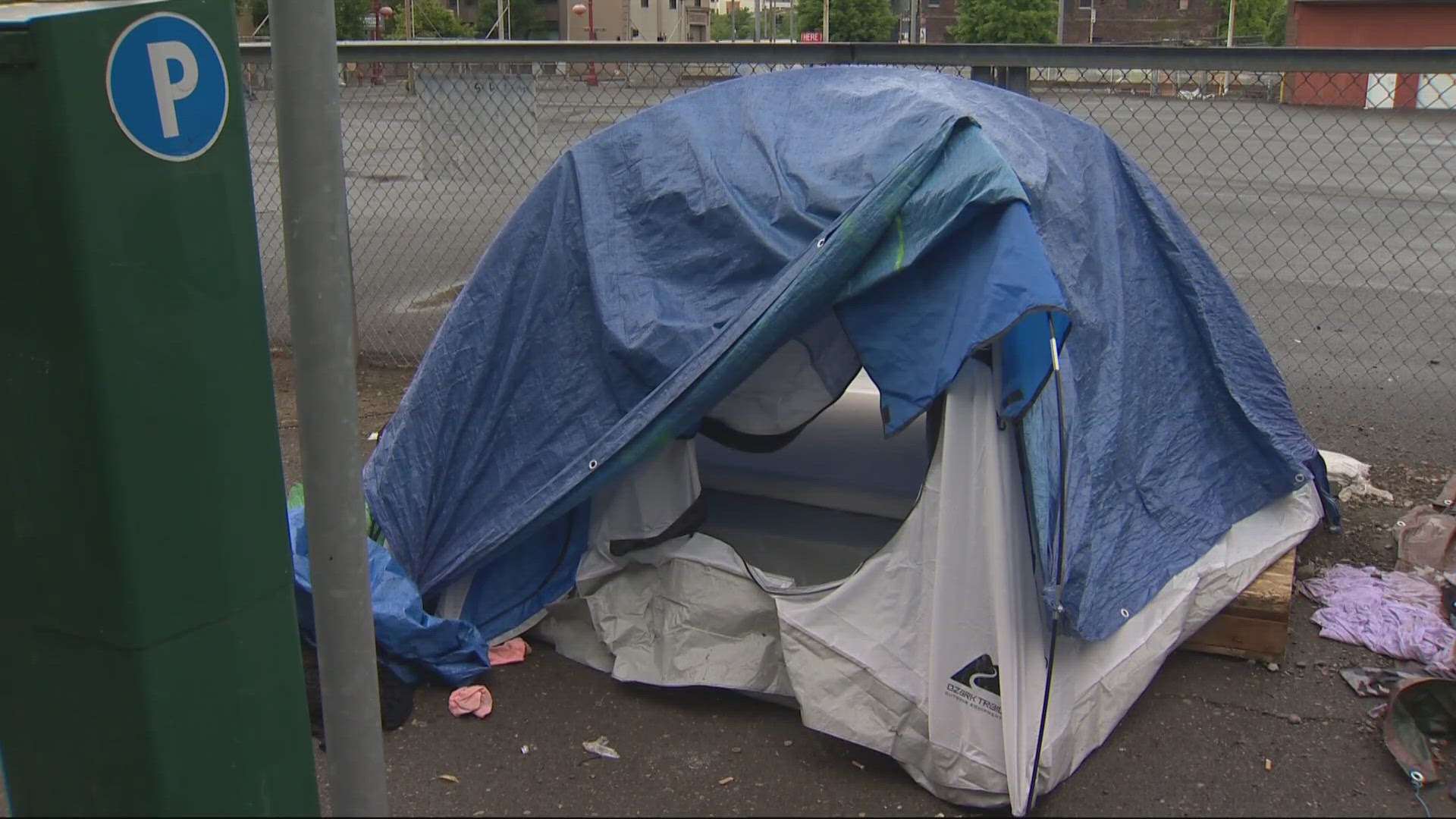PORTLAND, Ore. — The city of Portland began enforcement of its new ban on homeless camps Monday. Mayor Ted Wheeler first told KGW a week ago that enforcement would begin July 1. The ordinance will allow the city to fine or jail homeless people if there are shelter beds available and they refuse to take the offer.
Portland City Council adopted this revised camping ordinance in early May. It replaces a previous ordinance that banned camping on all public property during daytime hours, which a Multnomah County judge indefinitely blocked as a class action lawsuit against the city went forward.
"The city of Portland passed an ordinance that we thought was very moderate in terms of time, place and manner restrictions," Wheeler told The Story's Pat Dooris. "We believed we met what is called the reasonable standard that is required under House Bill 3115. But a Multnomah County judge enjoined us, meaning she decided that we had not met the threshold for reasonable time, place and manner restrictions. So that basically put it on hold."
Following a pair of pivotal court decisions at the Ninth Circuit Court of Appeals, the Oregon Legislature in 2021 passed a law shaping how cities can enforce ordinances on camping and sleeping in public. That bill, HB 3115, introduced the concept that cities can impose "time, place and manner" restrictions on camping, but only if they are objectively reasonable — a term that Wheeler believes is too subjective.
"The term 'reasonable' hasn't been defined by the legislature, and that is one thing that I would request that they do if they want to keep some time, place and manner restrictions in place — they have to define reasonable because the court refused to do it," Wheeler said. "We thought we defined reasonable."
So, with the city's ban on camping between 8 a.m. and 8 p.m. held up in court, Wheeler and the city's legal counsel went back to the drawing board. What they came up with hews much more closely to the text of Oregon law and those court decisions, banning camps entirely in some narrow circumstances, but otherwise allowing it when there is no shelter available.


Portland, and Multnomah County more broadly, does not have sufficient shelter for everyone living on the street, full stop. But with the new ordinance, Wheeler believes that they've still found a way to legally enforce a camping ban, if only in specific circumstances.
City outreach workers will be sent to a "problematic campsite" first, Wheeler said, and inform the people there that there are shelter beds available — something Portland is now able to do because it has an app for tracking in real time when and where shelter beds are open, at least in the city itself.
"We will know right on this spot when when the outreach worker gets to that site and says... 'I see you have your tent set up here, but I have an app right here, and I can tell you that right now in a specific location today, we have a reasonable shelter bed available for you,'" Wheeler said. "Reasonable means if you have a disability, it might be a shelter space that can accommodate somebody with a disability; you have a pet, we have a shelter space that can accommodate you with your pet; you have a partner, we have a shelter space that can accommodate you with your partner.
"That's what we mean when we define reasonable through our code, and we can tell through the app that we've developed whether there is a space available for you right now — if it is available, you've got to go. And if you refuse to go, then the social worker will call the Neighborhood Response Team officer, a police officer who will then come and give you one last chance to pick up your things and go. And if you don't, then you are subject to the enforcement mechanism."
Even if Wheeler and the city's legal counsel thought that the previous daytime camping ban complied with state law, it's clear that this new ordinance was designed to be much more insulated to legal challenge. However, the city's lack of overall available shelter, beyond the beds set aside for law enforcement, leaves open concerns that the camping ordinance will be selectively enforced.
"The only way you can define fairness, if you want to use the word 'fair,' is you establish rules, you make clear what the rules are, and everybody plays by the same rules," Wheeler said. "That's what's fair."
An amendment introduced by Commissioner Carmen Rubio, which was adopted along with the rest of the ordinance, requires the Portland Police Bureau to collect data on people arrested for camping in public in order to track whether the rules are being enforced disproportionately.
RELATED: Portland City Council hears heated public testimony on competing homeless camping ordinances
Under the law
When enforcement of the new ordinance begins, someone camping in public who refuses shelter could receive a fine of up to $100, up to 7 days in jail, or both. Camping is banned round-the-clock wherever it would block things like sidewalks or access to private property, and fires or gas heaters are banned. Personal belongings must be within two feet of a tent, and the ordinance bans activities that cause environmental damage.
"If you have reasonable access to a shelter or housing, you may not camp in the city of Portland," Wheeler said. "But if we do not have reasonable shelter for you at that time, then there are manner restrictions you must abide by. No ginormous tents, no fires, no blocking a door and other types of restrictions that you must abide by. If you refuse to abide by those restrictions, then there is a legal penalty."
The ordinance does include language encouraging the Multnomah County District Attorney to divert offenders into emergency shelter programs or other services when possible, in lieu of pursuing convictions for violating the camping ban.
Since May 22, Wheeler said, the city has been getting the word out about the new ordinance, handing out leaflets to people on the street and working with service providers so they can help educate their clients about the rules. The city has also been training outreach workers and law enforcement on the enforcement piece.


Enforcement of the new ordinance came ahead of a tectonic shift in the legal landscape for homelessness in the United States. One of the two court cases that shaped this landscape, a lawsuit out of southern Oregon known as Johnson v. Grants Pass, was argued before the U.S. Supreme Court in April. The court issued its decision on Friday, June 28, siding with Grants Pass, with the conservative majority ruling that laws regulating camping on public property do not violate the U.S. Constitution's ban on cruel and unusual punishment.
RELATED: Supreme Court issues decision in Oregon homelessness case, siding with Grants Pass in camping ban
In Johnson v. Grants Pass, a panel of judges at the Ninth Circuit Court of Appeals expanded on an earlier influential decision, Martin v. Boise, determining that cities cannot punish homeless people with civil or criminal penalties for camping outside if there is not sufficient shelter space available — amounting to "cruel and unusual punishment" under the Eighth Amendment.
Like the state case that suspended Portland's daytime camping ban, Johnson v. Grants Pass was a class action lawsuit originally brought by homeless residents against the city of Grants Pass. After losing at the Ninth Circuit, Grants Pass appealed to the Supreme Court in hopes of having the case overturned.
Johnson v. Grants Pass brought together some strange bedfellows, with nominally liberal and conservative groups alike submitting briefs to the Supreme Court in favor of its overturning; including the conservative Goldwater Institute, Democratic California Gov. Gavin Newsom, the city of Portland and the League of Oregon Cities, to name a few.
But, as Wheeler reminded the city council repeatedly while debating this new ordinance, Portland is restricted by HB 3115 no matter what the outcome of Johnson v. Grants Pass, which is why his office pushed ahead with the ordinance when and how they did. Unless the legislature decides to revisit the law in a future session, Oregon cities will need to act accordingly.
RELATED: Oregon lawmakers hint at possible HB 3115 update after Supreme Court ruling on homeless camping
"The main strategy that we're pursuing as an administration is going to continue," Wheeler said. "And that is, on one hand, we're going to maintain the public right of ways and public safety. On the other hand, our constituents overwhelmingly want us to offer humane alternatives to people living on the street. In other words, they want us to help them access whatever services they need to get off and stay off the street: behavioral health services, addiction treatment services and the like. That's going to continue."

